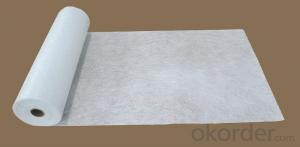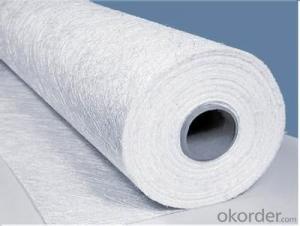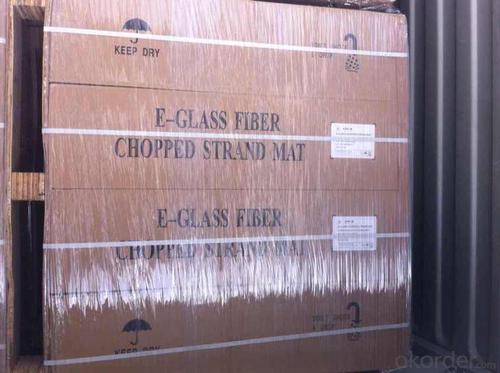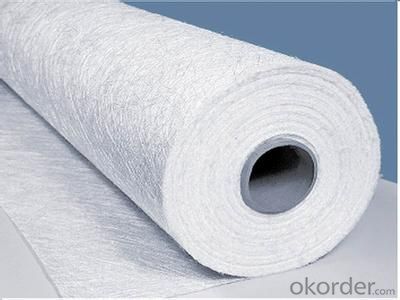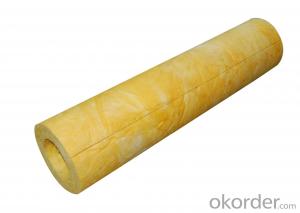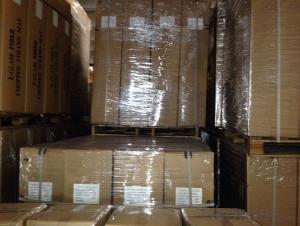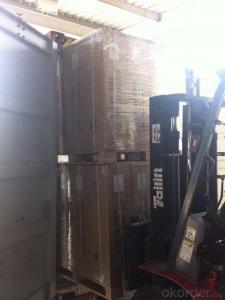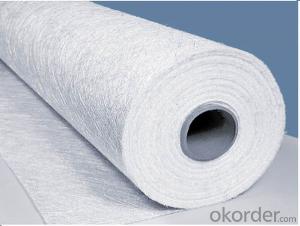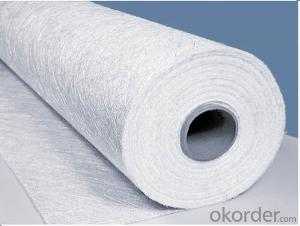Fiberglass Mat Tissue E Glass Fiber Chopped Strand Mat with Emulsion Binder Bonded
- Loading Port:
- Shanghai
- Payment Terms:
- TT OR LC
- Min Order Qty:
- 20000 kg
- Supply Capability:
- 200000 kg/month
OKorder Service Pledge
OKorder Financial Service
You Might Also Like
1.Brief Introduction
E-Glass Emulsion Chopped Strand Mat is made of randomly distributed chopped strands held tighter by a emulsion binder. It is compatible with UP, VE, EP resins.
It is compatible with UP, VE, EP, PF resins.
The roll width ranges from 50mm to 3300mm.
Additional demands on wet-out and decomposition time may be available upon request.
It is designed for use in hand lay-up, filament winding, compression molding and continuous laminating processes. Its end-use applications include boats, bath equipment, automotive parts, chemical corrosion resistant pipes, tanks, cooling towers and building components
2.Product Features
High tensile strength, allowing for use in hand lay-up process to produce large-area parts
Good wet-through and fast wet-out in resins, rapid air lease
Superior acid corrosion resistance
3.Product Specifications
Property | Area Weight | Moisture Content | Size Content | Breakage Strength | Width |
(%) | (%) | (%) | (N) | (mm) | |
Mathods | IS03374 | ISO3344 | ISO1887 | ISO3342 | |
EMC80E | ±7.5 | ≤0.20 | 8-12 | ≥40 | 50-3300 |
EMC100E | ≥40 | ||||
EMC120E | ≥50 | ||||
EMC150E | 4-8 | ≥50 | |||
EMC180E | ≥60 | ||||
EMC200E | ≥60 | ||||
EMC225E | ≥60 | ||||
EMC300E | 3-4 | ≥90 | |||
EMC450E | ≥120 | ||||
EMC600E | ≥150 | ||||
EMC900E | ≥200 |
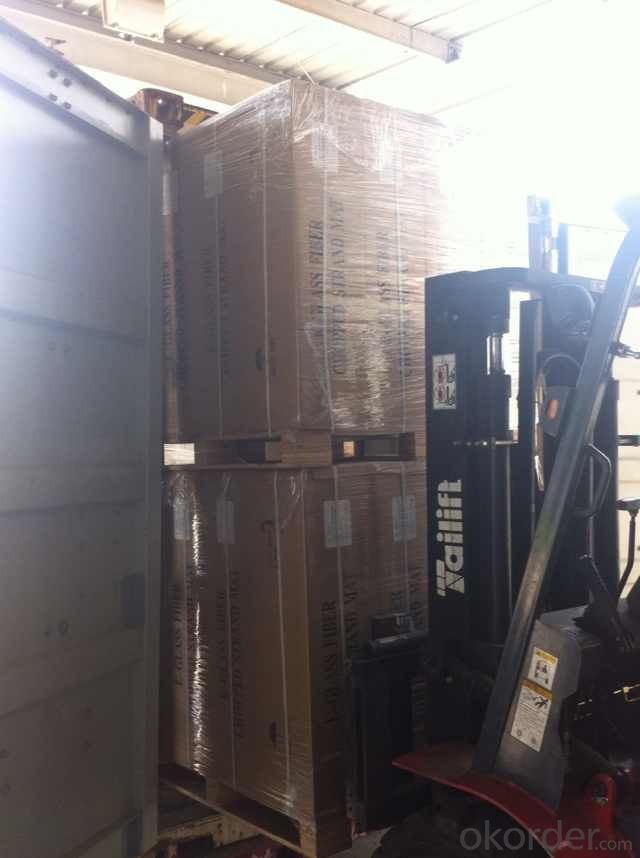 Packaging:
Packaging:
4.FAQ
Storage:
Unless otherwise specified, Chopped Strand Mat should be stored in a dry, cool and rain-proof area. It is recommended that the room temperature and humidity should be always maintained at 15℃~35℃ and 35%~65% respectively.
- Q: Can fiberglass mat tissue be used for mold making?
- Typically, fiberglass mat tissue is not employed in the process of mold making. Instead, it serves as a thin and lightweight substance composed of interwoven fiberglass strands. Its primary function lies in fortifying and bolstering composite materials, particularly fiberglass laminates. When it comes to mold making, silicone rubber, urethane rubber, or latex are commonly utilized materials. These possess flexibility and possess the ability to impeccably capture intricate details, making them optimal for generating molds of various objects. Furthermore, they possess excellent release properties, thereby facilitating the effortless removal of the mold from its original counterpart. Conversely, fiberglass mat tissue is rigid and lacks the necessary flexibility required in mold making. Rather, it finds greater suitability in applications necessitating strength and reinforcement, as opposed to the replication of intricate shapes or the creation of molds. Hence, if your aim is to fabricate molds, it is advised to select a material explicitly intended for that purpose, instead of utilizing fiberglass mat tissue.
- Q: What is the maximum temperature fiberglass mat tissue can withstand?
- The ability of fiberglass mat tissue to endure high temperatures is influenced by several factors, including the type of fiberglass utilized, the thickness of the tissue, and the manufacturing process. Typically, fiberglass mat tissue can withstand temperatures up to 1000°F (538°C) without experiencing significant deterioration or loss of mechanical properties. However, it is important to bear in mind that prolonged exposure to elevated temperatures can still lead to some decline in the material's performance. For applications that demand increased temperature resistance, specialized fiberglass materials with enhanced heat resistance can be employed. To obtain precise temperature ratings and guidelines for the specific fiberglass mat tissue being utilized, it is advisable to consult the manufacturer or supplier.
- Q: Is fiberglass mat tissue fire-resistant?
- No, fiberglass mat tissue is not inherently fire-resistant. While fiberglass itself is a non-combustible material, fiberglass mat tissue is typically combined with a binder or resin that may be flammable. However, specialty fiberglass mat tissue products are available that have been treated with fire-resistant coatings or additives to enhance their fire resistance properties. These treated materials can provide improved fire resistance and are commonly used in applications where fire safety is a concern, such as in certain construction or insulation materials. It is important to review the specific product specifications or consult with the manufacturer to determine the fire resistance capabilities of a particular fiberglass mat tissue.
- Q: Is fiberglass mat tissue biodegradable?
- No, fiberglass mat tissue is not biodegradable.
- Q: Is fiberglass mat tissue resistant to UV degradation?
- Fiberglass mat tissue is generally resistant to UV degradation to some extent. However, its level of resistance may vary depending on the specific type and quality of the fiberglass mat tissue. UV degradation occurs when prolonged exposure to ultraviolet (UV) radiation from the sun causes the degradation of materials. This degradation can lead to discoloration, brittleness, and reduced strength in the material. Fiberglass mat tissue is often manufactured with additives and coatings that provide some level of UV resistance. These additives and coatings help to protect the fibers from the damaging effects of UV radiation. However, it is important to note that the level of UV resistance can vary between different manufacturers and products. To ensure maximum UV resistance, it is recommended to choose fiberglass mat tissue that is specifically designed for outdoor applications and has been tested for UV stability. Additionally, proper maintenance and periodic inspections can help to identify any signs of UV degradation and allow for timely repairs or replacements if necessary.
- Q: Does fiberglass mat tissue provide any mold resistance?
- Fiberglass mat tissue does not inherently provide mold resistance. However, it can contribute to mold prevention when used in conjunction with other mold-resistant materials and proper construction practices. The fiberglass mat tissue itself is not resistant to mold growth, but it can be used as a reinforcement layer in mold-resistant building materials, such as mold-resistant drywall or sheathing. These materials are designed to resist mold growth by incorporating additives or coatings that inhibit the growth of mold and mildew. Additionally, it is important to ensure proper installation and maintenance of these materials to minimize moisture buildup and create a less favorable environment for mold growth.
- Q: How is fiberglass mat tissue used in the production of water tanks?
- Fiberglass mat tissue is used in the production of water tanks to provide reinforcement and durability. It is applied as a layer between the inner and outer walls of the tank to enhance its structural integrity and prevent leakage. The fiberglass mat tissue acts as a barrier against corrosion, increases the tank's resistance to external factors such as temperature changes and chemicals, and improves its overall strength.
- Q: Can fiberglass mat tissue be used for acoustic panels?
- Yes, fiberglass mat tissue can be used for acoustic panels. Fiberglass mat tissue is a lightweight material that is commonly used for sound absorption and insulation purposes. It has excellent sound-absorbing properties and can effectively reduce noise levels in various applications, including acoustic panels. It is often used as the core material in acoustic panels to enhance their sound-absorbing capabilities. Additionally, fiberglass mat tissue is easy to work with, making it a popular choice for DIY acoustic panel projects. However, it is important to note that the effectiveness of acoustic panels also depends on other factors such as panel design, thickness, density, and installation method. Therefore, it is recommended to consult with experts or conduct thorough research to ensure that fiberglass mat tissue is the appropriate material for your specific acoustic panel needs.
- Q: What is the chemical resistance of fiberglass mat tissue?
- The excellent chemical resistance of fiberglass mat tissue stems from the inherent properties of the fiberglass material. Typically, the mat tissue consists of woven or bound glass fibers, forming a protective barrier against a diverse array of chemicals. The glass fibers themselves possess a high resistance to corrosion, rendering fiberglass mat tissue suitable for use in environments where chemical exposure is a concern. The chemical resistance of fiberglass mat tissue can vary based on the specific resin or binder used in the manufacturing process. Various types of resins may offer superior resistance to certain chemicals, while others may be more susceptible to degradation. It is crucial to consider the specific chemicals that will come into contact with the fiberglass mat tissue and choose a compatible resin or binder accordingly. In general, fiberglass mat tissue is renowned for its ability to withstand acids, alkalis, solvents, and other commonly found industrial and commercial chemicals. It can endure exposure to a wide range of corrosive substances, making it a versatile and long-lasting material for various applications. Nevertheless, it is important to note that prolonged exposure to highly concentrated or aggressive chemicals may eventually result in some degradation or deterioration of the fiberglass mat tissue. Therefore, it is imperative to consult the manufacturer's specifications and guidelines to ensure proper chemical compatibility and performance in specific environments.
- Q: Can fiberglass mat tissue be used in marine applications?
- Yes, fiberglass mat tissue can be used in marine applications. It is commonly used in boat building and repair due to its excellent strength, corrosion resistance, and durability in marine environments.
Send your message to us
Fiberglass Mat Tissue E Glass Fiber Chopped Strand Mat with Emulsion Binder Bonded
- Loading Port:
- Shanghai
- Payment Terms:
- TT OR LC
- Min Order Qty:
- 20000 kg
- Supply Capability:
- 200000 kg/month
OKorder Service Pledge
OKorder Financial Service
Similar products
Hot products
Hot Searches
Related keywords

